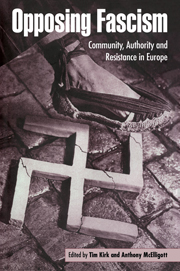Book contents
- Frontmatter
- Contents
- List of contributors
- Preface
- Introduction: Community, authority and resistance to fascism
- 1 The German revolution defeated and fascism deferred: the servicemen's revolt and social democracy at the end of the First World War, 1918–1920
- 2 Dangerous communities and conservative authority: the judiciary, Nazis and rough people, 1932–1933
- 3 The anti-fascist movement in south-east Lancashire, 1933–1940: the divergent experiences of Manchester and Nelson
- 4 Spain 1936. Resistance and revolution: the flaws in the Front
- 5 The Blueshirts in the Irish Free State, 1932–1935: the nature of socialist republican and governmental opposition
- 6 Town councils of the Nord and Pas-de-Calais region: local power, French power, German power
- 7 Structures of authority in the Greek resistance, 1941–1944
- 8 Nazi Austria: the limits of dissent
- 9 ‘Homosexual’ men in Vienna, 1938
- 10 ‘The years of consent’? Popular attitudes and forms of resistance to Fascism in Italy, 1925–1940
- 11 Saints and heroines: rewriting the history of Italian women in the Resistance
- Notes
- Index
Introduction: Community, authority and resistance to fascism
Published online by Cambridge University Press: 28 July 2009
- Frontmatter
- Contents
- List of contributors
- Preface
- Introduction: Community, authority and resistance to fascism
- 1 The German revolution defeated and fascism deferred: the servicemen's revolt and social democracy at the end of the First World War, 1918–1920
- 2 Dangerous communities and conservative authority: the judiciary, Nazis and rough people, 1932–1933
- 3 The anti-fascist movement in south-east Lancashire, 1933–1940: the divergent experiences of Manchester and Nelson
- 4 Spain 1936. Resistance and revolution: the flaws in the Front
- 5 The Blueshirts in the Irish Free State, 1932–1935: the nature of socialist republican and governmental opposition
- 6 Town councils of the Nord and Pas-de-Calais region: local power, French power, German power
- 7 Structures of authority in the Greek resistance, 1941–1944
- 8 Nazi Austria: the limits of dissent
- 9 ‘Homosexual’ men in Vienna, 1938
- 10 ‘The years of consent’? Popular attitudes and forms of resistance to Fascism in Italy, 1925–1940
- 11 Saints and heroines: rewriting the history of Italian women in the Resistance
- Notes
- Index
Summary
Increasingly, history impinges on the attention of the public through the celebration of anniversaries as conveyed by the media. In Europe at the end of the twentieth century this form of commemoration has been dominated by the fiftieth anniversaries of the origins and course of the Second World War: the appointment of Hitler as chancellor of Germany in 1933, the outbreak of war in 1939, the liberation of Europe from fascism in 1945. Commemorating recent history in this way has not been unproblematic for the leaders of post-war western Europe. Indeed, two such public anniversaries celebrated in Europe in 1994 threw the problem into sharp relief. Britain and France celebrated the D-Day landings in June with their former war-time Allies, but Germany was excluded, and commemorated alone the bomb plot against Hitler in July. In its own way, each of these events reiterated powerful points in our collective and public memory of fascism and the war. For the Allies, the conflict had been one of nation against nation and was decided on the battlefield by Allied forces and armed resistance organisations operating as adjuncts of those armies. That version of the war excluded the idea of a broader resistance to fascism on the continent (including Germany itself).
- Type
- Chapter
- Information
- Opposing FascismCommunity, Authority and Resistance in Europe, pp. 1 - 11Publisher: Cambridge University PressPrint publication year: 1999



